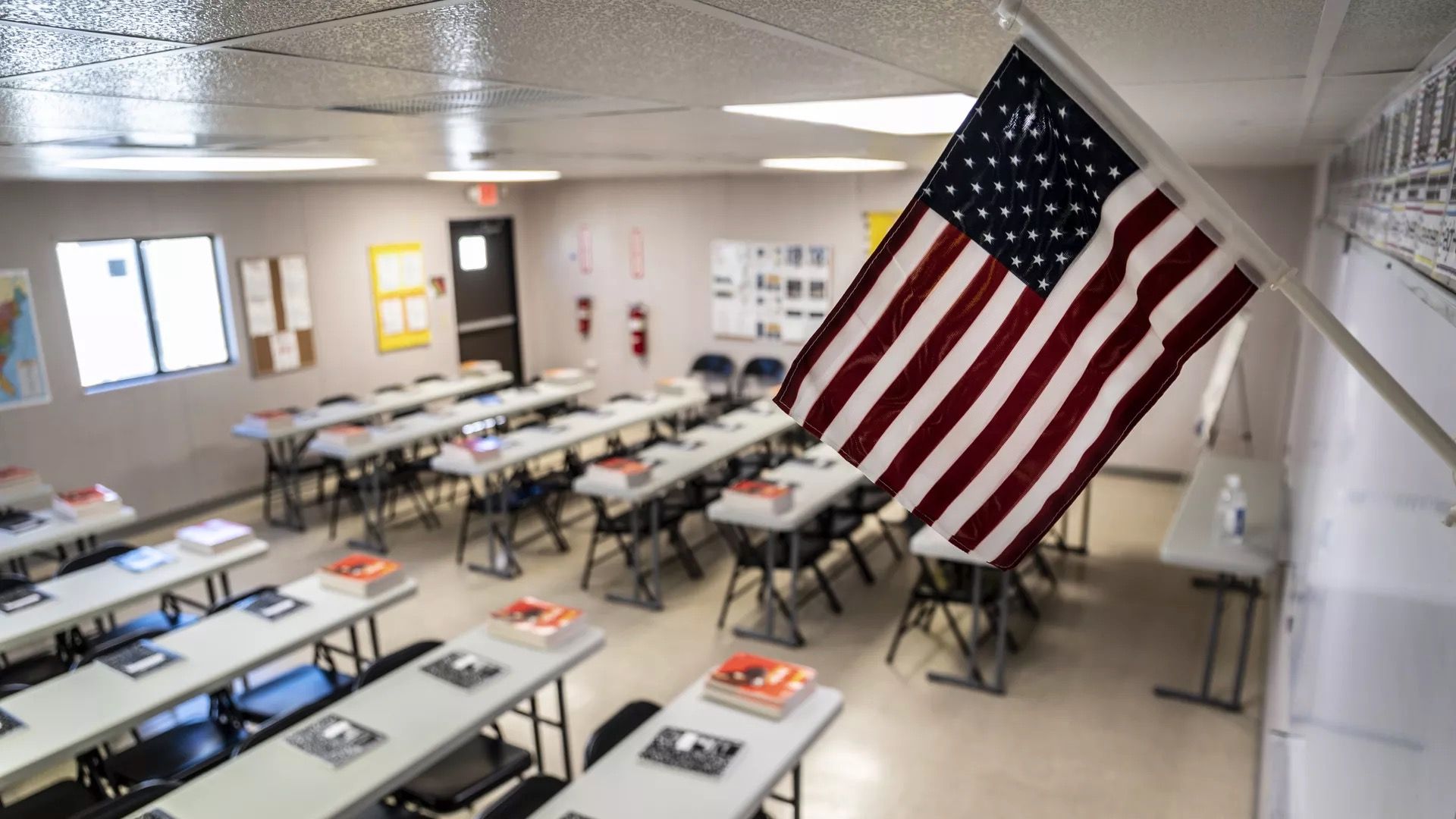| |
| |
| |
| Presented By Facebook |
| |
| Axios Sneak Peek |
| By Alayna Treene, Hans Nichols and Kadia Goba ·May 13, 2021 |
| Welcome back to Sneak. Eid Mubarak, for those observing it. ⚡ Situational awareness: Rep. Alexandria Ocasio-Cortez (D-N.Y.) offered a Bronx cheer today to Rep. Marjorie Taylor Greene (R-Ga.), as TPM captured. Today's newsletter — edited by Glen Johnson — is 960 words, a 3.5-minute read. |
| |
| |
| 1 big thing: Democrats open to user fees for infrastructure deal |
 |
|
| President Biden sits today with Sen. Shelley Moore Capito (R-W.Va.) as they discuss his $2.3 trillion infrastructure proposal. Photo: T.J. Kirkpatrick/The New York Times/Bloomberg via Getty Images |
| |
| Some Senate Democrats are open to paying for a compromise infrastructure package by imposing user fees, including increasing the gas tax and raising money from electric car drivers through a vehicle-miles-traveled charge, Axios' Hans Nichols and Alayna Treene report. Why it matters: By inching toward the Republican position on pay-fors, some Democrats are bucking President Biden's push to offset his proposed $2.3 trillion plan by focusing only on raising taxes on corporations and the wealthy. - "User fees have to be part of the mix," Sen. Mark Warner (D-Va.) told Axios on Thursday.
- "I am generally supportive of what the president is trying to do, but I think his initial unwillingness to include user fees makes it really hard."
- In separate meetings with Biden this week, both Sens. Tom Carper (D-Del.) and Kyrsten Sinema (D-Ariz.) discussed the possibility of imposing user fees, according to people familiar with the matter.
Driving the news: Senate Republicans emerged from their meeting with Biden on Thursday optimistic about a bipartisan deal, focusing on "hard" infrastructure projects like roads, bridges and waterways. - "We think this infrastructure package can carry forward," Sen. Shelley Moore Capito (R-W.Va.) said.
- The president agreed: "I am very optimistic that we can reach a reasonable agreement. But even if we don't, it's been a good-faith effort that we started."
- He added: "We didn't compromise on anything."
Between the lines: Some Democrats are opposed to relying on user fees to fund new projects because lower-income Americans would pay a disproportionate share of their income to use the same roads as the wealthy. - User fees also could be interpreted as a tax increase on Americans making less than $400,000 a year, which Biden promised not to do.
Go deeper: Other Democrats want to find a way to explore user fees but make them less regressive. - "I've asked the commissioner of the IRS to explore for us, whether or not there is a way to somehow give a rebate to lower-income families," Carper said.
Keep reading. |
    |
| |
| |
| 2. Biden administration mum on tracking migrant kids |
 |
|
| A classroom at an Influx Care Facility for unaccompanied migrant children. Photo: Sergio Flores/The Washington Post via Getty Images |
| |
| Thousands of migrant kids have been released by the Biden administration to caretakers in the U.S. as part of the government's program for unaccompanied minors — but there's little-to-no visibility about what's happened to them, Axios' Stef Kight reports. Flashback: During the Trump administration, there was outrage when a top official told Congress his agency was unable to verify the locations of about 1,500 kids released to sponsors. Today, the agency in charge won't answer questions about its efforts to keep track of these vulnerable children. Between the lines: The Department of Health and Human Services' Administration for Children and Families requires that check-in calls be made to sponsors — often a parent or other relative — 30 days after a child is released. - The agency has denied requests from Axios for data about whether the calls are being made or sponsors have been reached.
- About 10,000 to 15,000 migrant children have received post-release services in recent fiscal years, according to HHS data, although it is not always required.
- Axios also was refused information about how many kids have received these services since Biden took office.
Reality check: HHS shelters take in unaccompanied children who cross the border until a sponsor can be found. But the program "was never intended as a process for ongoing engagement and tracking," said Mark Greenberg, who oversaw the unaccompanied minors program during the Obama administration. - There are many reasons why shelter workers may have difficulty reaching families after releasing a child — including fear of information being shared with immigration law enforcement agencies.
- Still, the record numbers of kids crossing into the U.S. in recent months lay bare the shortcomings of the government's process to handle them.
Keep reading. |
    |
| |
| |
| 3. By the numbers: Where the earmarks are wanted |
 Data: House Committee on Appropriations; Chart: Danielle Alberti/Axios The Dallas-Fort Worth area is being targeted for the largest collective earmark request in the country, according to a detailed breakdown of overall requests released by the House Appropriations Committee and reviewed by Axios' Lachlan Markay. Why it matters: House appropriators are trying to balance bipartisan momentum for infrastructure investment with "pork-barrel" spending's checkered political history. The data dump is an effort to provide transparency for what are now termed "community project funding" requests. - The Appropriations Committee released details on nearly 3,000 requests.
- House members are limited to 10 requests each, according to committee guidelines, but there's no overall dollar limit.
- The Texas ZIP Code leading the country in terms of earmark requests is home to Dallas/Fort Worth International Airport, the country's fourth busiest.
- While it's targeted for the most funding in terms of the sums requested, there's no guarantee each of the three requests made for it — filed by three different lawmakers — will be fulfilled.
|
    |
| |
| |
| A message from Facebook |
| The internet has changed a lot since 1996 - internet regulations should too |
| |
 |
| |
| It's been 25 years since comprehensive internet regulations passed. See why we support updated regulations on key issues, including: - Protecting people's privacy
- Enabling safe and easy data portability between platforms
- Preventing election interference
- Reforming Section 230
|
| |
| |
| 4. Progressive legal advocacy group spinning off from sponsor |
 |
|
| Illustration: Annelise Capossela/Axios |
| |
| A leading progressive legal advocacy group is spinning off from the sprawling dark money network that seeded it, the group tells Lachlan. Why it matters: Demand Justice's decision to separate from the Sixteen Thirty Fund, a "fiscal sponsor" for scores of left-wing organizations, will provide the public with its first detailed look behind the curtain of the influential progressive nonprofit. - As stand-alone nonprofits, Demand Justice and its 501(c)(3) arm, the Demand Justice Initiative, will have to reveal new information about their structures and finances.
What they're saying: Demand Justice co-founder and executive director Brian Fallon told Axios his group has outgrown the umbrella organization under which it operated for its first three years. The big picture: Demand Justice is the tip of the progressive spear in battles over the makeup of the federal judiciary. - Fallon, formerly the top spokesman at the Department of Justice, formed the group to counter influential conservative organizations such as the Federalist Society and the Judicial Crisis Network.
- Demand Justice has made headlines recently for running ads calling on Supreme Court Justice Stephen Breyer to resign so he can be replaced by a Black woman.
Keep reading. |
    |
| |
| |
| 5. Pic du jour |
 |
|
| Photo: Oliver Contreras/Pool/AFP via Getty Images |
| |
| A photo that would be unremarkable except everyone is maskless. - The CDC dropped its mask mandates for vaccinated people mid-flight, so first lady Jill Biden (center) was able to pose with (from left) Mark Shriver, president of Save the Children Action Network, actress Jennifer Garner and Sen. Joe Manchin (D-W.Va.) and his wife, Gayle.
- The group then visited a COVID-19 vaccination center in Charleston, W.Va.
|
    |
| |
| |
| A message from Facebook |
| Why Facebook supports updated internet regulations |
| |
 |
| |
| 2021 is the 25th anniversary of the Telecommunications Act of 1996, the last major update to internet regulation. It's time for an update to set clear rules for addressing today's toughest challenges. See how we're taking action on key issues and why we support updated internet regulations. |
| |
| 👍 Thanks for reading Sneak this week. We'll be back Sunday evening. Please let your family, friends and colleagues know they can sign up for email delivery through this link. |








No comments:
Post a Comment